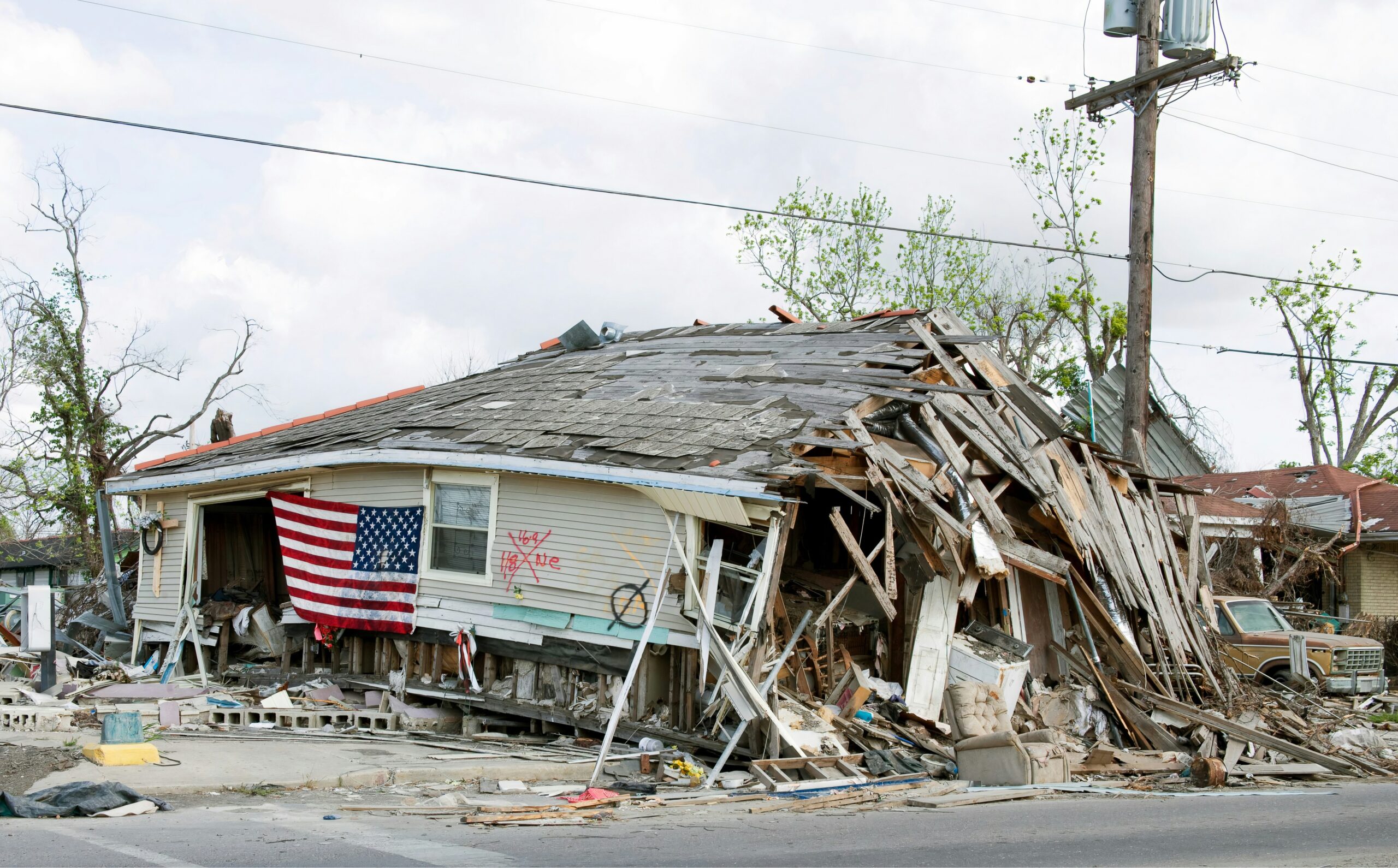Katrina’s devastation sparked a lasting American Baptist response that is now a permanent ministry of rebuilding and renewal
VALLEY FORGE, PA (09/11/2025)—When Hurricane Katrina hit New Orleans on August 29, 2005, 80 percent of the city was flooded, leading to the devastating loss of 1400 lives (some sources suggest the higher number of 1833 lives). The Black residents of New Orleans suffered the most; many lived in low-cost housing below the sea level that was not sufficiently protected from flooding by the faulty levees. There also weren’t any evacuation plans for the poor residents of the city, many of whom did not have their own transportation or any place to escape to.

The aftermath of Hurricane Katrina: A destroyed residence in New Orleans’ devastated Lower Ninth Ward. Library of Congress photo courtesy of Unsplash.
“The fact that over 62% of the dead and 80% of those stranded on rooftops in New Orleans were black was not coincidental,” wrote scholar Katie Bell. After Hurricane Katrina, Black homeowners received much less government assistance than white residents. Many did not receive insurance payouts as flood damage was not included in their home insurance coverage. In the wake of this catastrophe, compounded by structural inequalities, Baptists marshaled volunteers and resources to support the affected communities living along the Gulf Coast. This campaign (known as “Baptist Builders: Rebuilding lives, Rebuilding families, Rebuilding churches,”) comprised hundreds of ordinary Baptists who traveled in waves to Louisiana, Mississippi, and Alabama, where they helped rebuild damaged homes and church buildings.
Given the longstanding racial and economic inequalities in New Orleans, ABHMS’ work was focused on supporting Black neighborhoods, such as the Lower Ninth Ward, which suffered the deepest losses and received the slowest government support. ABHMS partnered with Habitat for Humanity, an ecumenical Christian organization, and recognizing that help was needed beyond emergency aid, became one of the major advocates for a just rebuilding of the Gulf Coast. ABHMS’ long-term initiative “Home Mission: ’Til the Work is Done” in the Lower Ninth Ward was launched in 2006, with American Baptist volunteers returning year after year to help families rebuild their lives.
By 2015, ABHMS had organized 8,926 volunteers around the United States, including 5,236 volunteers in the Gulf Coast and 957 volunteers for “Home Mission: ’Til the Work is Done.” Other accomplishments had included 25 homes built with Habitat for Humanity of Greater Baton Rouge, seven homes with Habitat for Humanity of the Mississippi Gulf Coast, and 21 homes in Pearlington, Miss.
In order to buy the Habitat for Humanity houses, families provided a part of the construction labor and were offered affordable, interest-free mortgages. One of the new homeowners was Fannie Munson, who was raising her five grandchildren on her own in a two-bedroom apartment. The family was displaced after Hurricane Katrina and was relocated to Baton Rouge. Munson, a retired hospitality sector worker, was hopeful about having a safe and secure environment in which to raise her grandchildren. Another was Trellis Lallande, a mother of two, whose apartment was destroyed by Katrina. Lallandale, a nurse’s aide, eventually settled down in her new home in Greater Baton Rouge.
“We located needs, mobilized substantial financial and human resources, and responded with everything we had,” said Dr. Jeffrey Haggray, then executive minister of the District of Columbia Baptist Convention and the current executive director of ABHMS. “I know that we made a difference in the lives of those we touched. Our response continued for a very long time in the years following Katrina. We demonstrated that Baptists can do so much good when we work together with common objectives on a shared mission.”
As a result of the Katrina response experience, ABHMS consolidated its approach as what is now known as Disaster Response Ministries. It is a permanent framework for mobilizing Baptist volunteers in times of crisis. The “Rebuilding, Restoring, Renewing Puerto Rico” initiative (after the disastrous Hurricane Maria in 2017) built directly on lessons from American Baptist efforts in response to Katrina.
The American Baptist response to Katrina, Maria, and other disasters showed what is possible when people of faith come together. The conviction that disaster response is not an occasional duty or act of charity, but a permanent part of our mission stands strong. From the Lower Ninth Ward to Puerto Rico and beyond, American Baptists now engage in a ministry shaped by Katrina’s lessons: to act quickly, to work for justice, and to remain until the work is done.
We invite you to join in carrying forward this work. Your gifts to One Great Hour of Sharing, which support ABHMS’ Disaster Response Ministries, ensure that when the next storm strikes, American Baptists are ready to show up again with courage and faith. Together, we can continue rebuilding lives and communities in Christ’s name.
By Rev. Dr. Anna Piela, ABHMS senior writer and associate editor of The Christian Citizen

